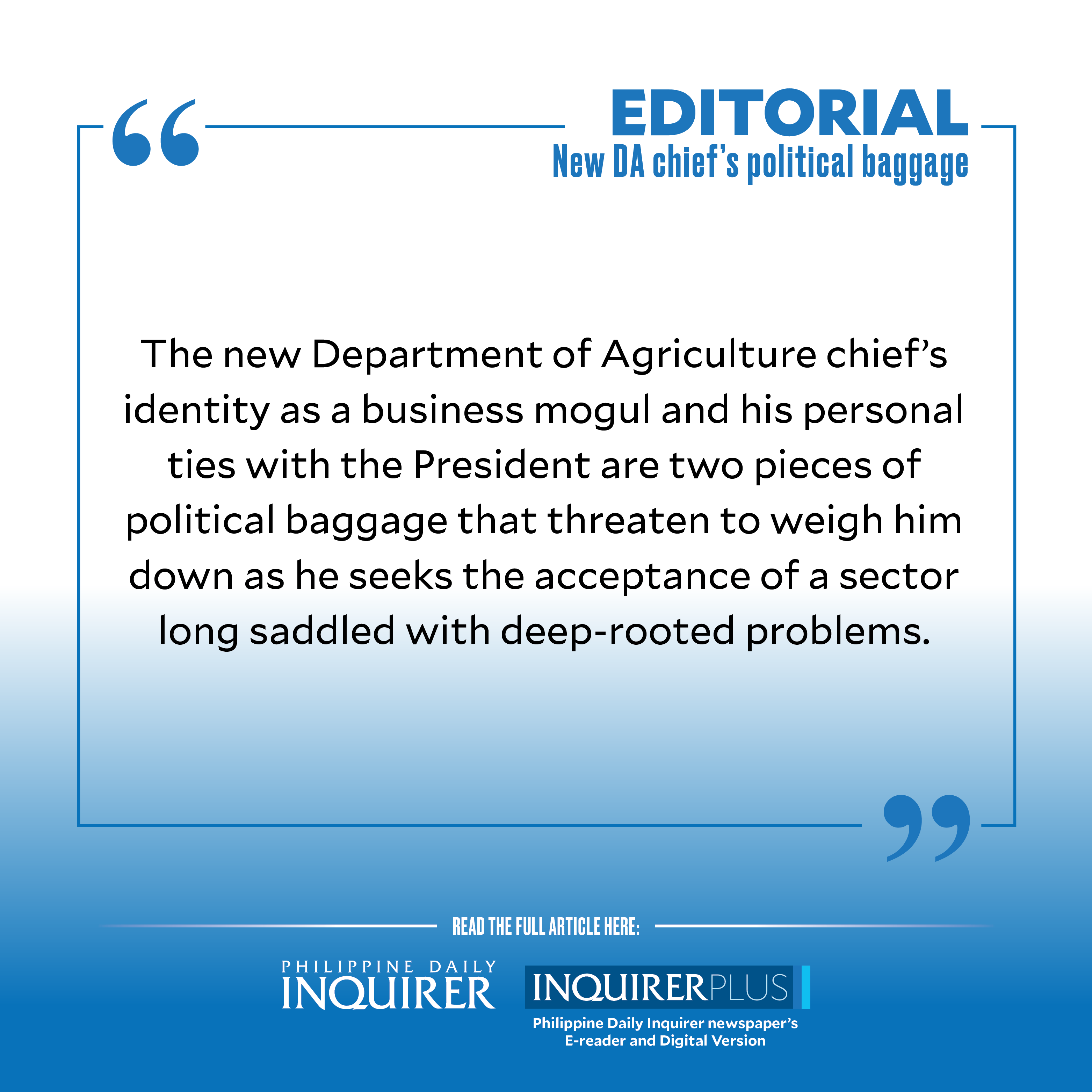New DA chief’s political baggage

Not a payback” but a “sacrifice” is how fishing magnate Francisco Tiu Laurel Jr. describes his appointment as agriculture secretary by his boyhood friend, President Marcos, to whose campaign he contributed P30 million last year.
The way Laurel tells it, farming and fisheries groups ought to be grateful that the 56-year-old tycoon had chosen to leave his Frabelle empire behind to take the helm of the Department of Agriculture (DA), replacing Mr. Marcos who had warmed that seat for him for 16 months.
“This is for the country,” said Laurel, noting that in compliance with the Constitution, he had divested himself of all corporate holdings and interests in, among others, deep-sea fishing and aquaculture, food manufacturing, importation and trading, shipyard operations, wharf and real estate development, and power generation.
“DA is a full-time job. I have no time to do anything else,” insisted Laurel.
But the new DA chief’s identity as a business mogul and his personal ties with the President are two pieces of political baggage that threaten to weigh him down as he seeks the acceptance of a sector long saddled with deep-rooted problems.
More so, his donation to Mr. Marcos’ campaign kitty, a gift pregnant with the implication of future rewards, even one between old friends, will likely hound Laurel for the duration of his office, a distraction neither he nor his department needs at this time. (At least six other people who contributed to Mr. Marcos’ campaign have been named to government posts, no doubt a testament to his donors’ self-sacrificing nature.)
Still, it had taken the Chief Executive well over a year to pick a permanent agriculture secretary, during which the troubles afflicting the sector, from smuggling of rice, sugar, onion, and other produce to overpricing due to profiteering, had multiplied, as the overstretched Mr. Marcos failed to dazzle in his self-inflicted concurrent role.
Now the President expects his childhood buddy to accomplish what he himself couldn’t.
The good news is that although Laurel doesn’t hold the powers Mr. Marcos once believed are needed by an agriculture secretary, he nonetheless enjoys the President’s trust, which we can only hope he can transform into meaningful action and reforms.
Laurel, according to Mr. Marcos, “understands very well the problems that agriculture is facing.” But it is one thing to understand the problems and another thing entirely to go about fixing them.
We don’t doubt that Laurel, as someone versed in the ins and outs of agricultural production and food processing, should be intimately familiar with the sector over which he now exercises supervision, but the trouble lies in which hat he will wear during this process: that of a businessman or a public servant.
ACT Teachers Rep. France Castro fired the opening salvo by calling attention to an allegation that Laurel’s Frabelle Fishing Corp. was behind a reclamation project that displaced over 700 families from two coastal villages in Bacoor City.
Citing his divestment of his Frabelle holdings, Laurel declined to discuss the project, one of those halted by the government in August pending a review. But we ask: what difference does his divestment make when the business is family-owned anyway?
At any rate, this project bears close watching, because it may well be the first test on the inevitable clash of interests between Laurel’s current role and his family and business background.
Meanwhile, agriculture stakeholders, led by the Federation of Free Farmers, are urging Laurel to reverse the government’s “pro-import bias” and to listen to the concerns of “small farmers, municipal fishers and other disadvantaged members” of the sector.
In response to such calls, Laurel declared: “I’m not for importation. I am pro-production.”
“While I import, I produce a lot more so I believe that the Filipinos can produce more,” Laurel said, citing the need to find the perfect balance between keeping prices low and producers profitable.
That’s encouraging to hear, but he should know that words are cheap, and the real measure of his leadership is if he succeeds in lowering the cost of inputs, improving infrastructure, and raising the competitiveness of small farmers and fisherfolk.
Agriculture is a vital component of the social contract the President formed with the people when he was elected last year on a platform promising rice prices of as low as P20 to P30 per kilo.
Laurel, entrusted by his good friend to realize that pledge, admits: “Today, it is not possible … it might take a little time.” But if he hopes to arrest all doubts about his political baggage and uncertain loyalties, it is in Laurel’s own best interest to hit the ground running.




















